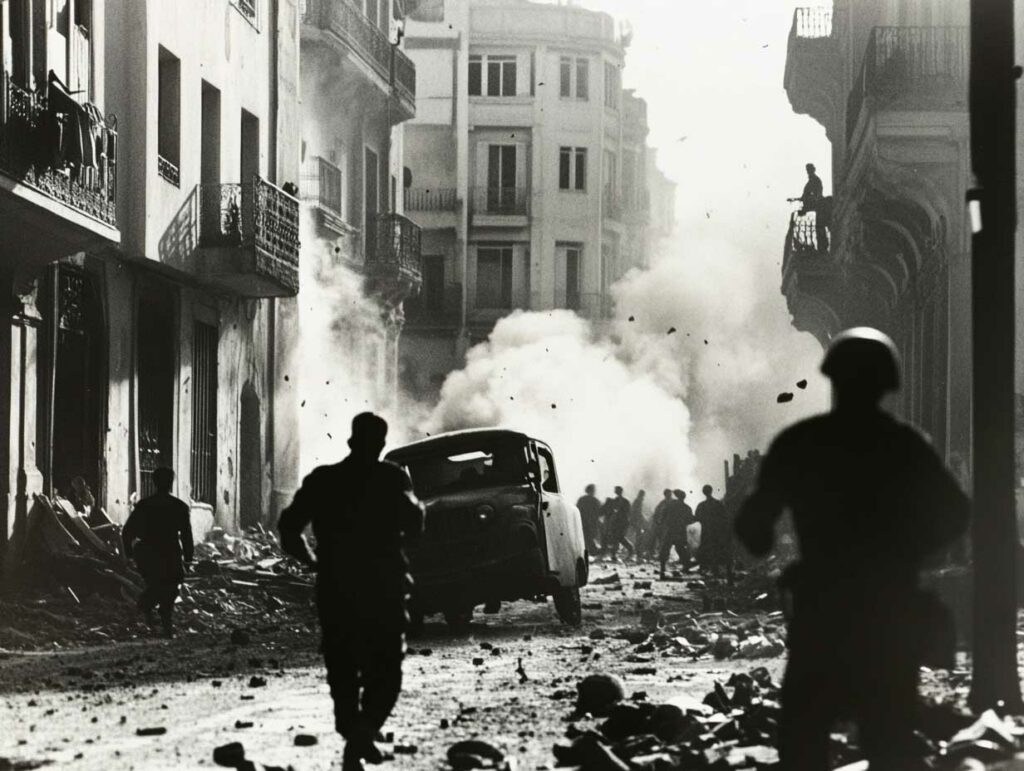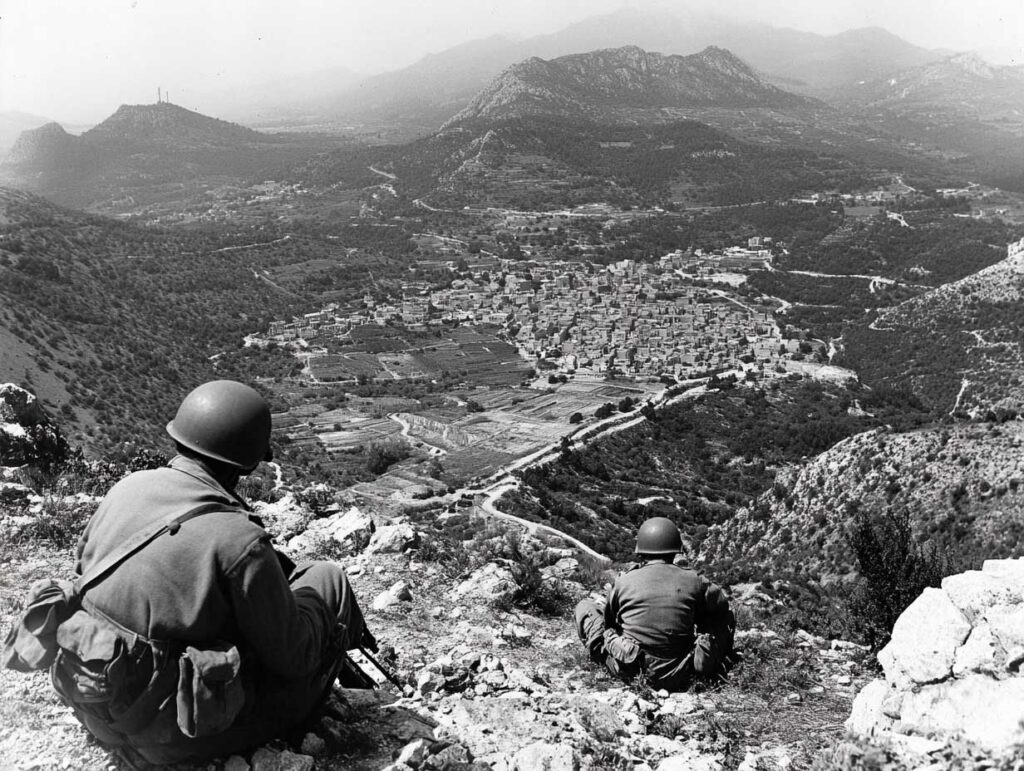An in-depth examination of the Algerian War of Independence (1954–1962), exploring its causes, key figures, major battles, turning points, and lasting consequences.
Quick Read
The Algerian War of Independence (1954–1962) was a pivotal conflict between France and Algerian nationalist movements, primarily the National Liberation Front (FLN). The war emerged from deep-rooted grievances over French colonial rule, economic disparities, and the suppression of Algerian identity. Initiated by coordinated FLN attacks on November 1, 1954, the conflict escalated into a brutal war characterized by guerrilla warfare, terrorism, and severe counter-insurgency measures. Key figures included FLN leaders such as Ahmed Ben Bella and French officials like General Jacques Massu. Major battles, including the Battle of Algiers, marked significant phases of the war. The conflict culminated in the Evian Accords of March 1962, leading to Algeria’s independence on July 5, 1962. The war had profound consequences, including significant loss of life, mass displacement, and enduring political and social impacts in both Algeria and France.

What Were the Reasons for the Algerian War of Independence (1954–1962)?
The Algerian War of Independence was rooted in longstanding grievances stemming from French colonial rule, which began in 1830. Under French administration, Algerians faced systemic economic exploitation, political disenfranchisement, and cultural suppression. The French colonial system favored European settlers (pieds-noirs), who controlled the majority of arable land and occupied privileged positions in society, leading to significant economic disparities. Algerians were subjected to discriminatory laws and denied political representation, fostering widespread resentment. The aftermath of World War II intensified these sentiments, as returning Algerian soldiers who had fought for France were met with unfulfilled promises of greater autonomy and rights. The Sétif and Guelma massacres in May 1945, where French forces violently suppressed Algerian demonstrations, resulting in thousands of deaths, further deepened animosity and highlighted the urgent need for change. These events galvanized nationalist sentiments, leading to the formation of the FLN, which sought to achieve independence through armed struggle.
Who Was Involved in the Algerian War of Independence (1954–1962)?
The primary actors in the Algerian War of Independence were the National Liberation Front (FLN) and the French government. The FLN, established in 1954, was the principal nationalist movement advocating for Algerian independence. It operated through its armed wing, the National Liberation Army (ALN), conducting guerrilla warfare and mobilizing support among the Algerian populace. The French government, determined to maintain Algeria as an integral part of France, deployed substantial military forces, including elite units like the French Foreign Legion and paratrooper regiments, to suppress the insurgency. The conflict also involved various Algerian civilian populations, who were often caught between the opposing forces, facing reprisals and forced relocations. Additionally, European settlers (pieds-noirs) in Algeria formed groups opposing independence, such as the Organisation de l’Armée Secrète (OAS), which conducted violent campaigns to prevent Algerian self-determination.
The Leaders of the Algerian War of Independence (1954–1962)
Key figures in the Algerian War of Independence included:
- Ahmed Ben Bella: A founding member of the FLN and a prominent leader in the independence movement. He became Algeria’s first Prime Minister and later its first President after independence.
- Houari Boumédiène: Commander of the ALN’s Western Front and later Chief of Staff. He played a crucial role in military operations and succeeded Ben Bella as President in 1965.
- Larbi Ben M’hidi: A senior FLN leader instrumental in orchestrating the Battle of Algiers. He was captured and assassinated by French forces in 1957.
- General Jacques Massu: Commander of French forces during the Battle of Algiers, known for implementing severe counter-insurgency tactics, including torture.
- General Raoul Salan: Commander-in-Chief of French forces in Algeria from 1956 to 1958. He later became a leading figure in the OAS, opposing Algerian independence.
These leaders significantly influenced the strategies and outcomes of the conflict, shaping the course of Algeria’s struggle for independence.
Was There a Decisive Moment?
A decisive moment in the Algerian War of Independence was the Battle of Algiers (1956–1957). The FLN orchestrated a campaign of urban guerrilla warfare and bombings in Algiers, aiming to disrupt French control and draw international attention to their cause. In response, French forces, under General Jacques Massu, implemented stringent counter-insurgency measures, including widespread arrests, curfews, and systematic torture to extract information and dismantle the FLN network. While the French military succeeded in suppressing the FLN’s urban operations, the harsh tactics employed led to international condemnation and eroded support for French policies both domestically and abroad. The battle highlighted the intensity of the conflict and underscored the determination of the Algerian independence movement, marking a significant phase in the war.
Major Battles of the Algerian War of Independence (1954–1962)
Several key battles and operations defined the Algerian War of Independence:
- Battle of Algiers (1956–1957): A pivotal confrontation where the FLN launched a series of bombings and assassinations in Algiers. The French military responded with a major counter-insurgency operation, ultimately suppressing the FLN’s urban presence but drawing international criticism for their methods.
- Battle of Philippeville (1955): The FLN attacked the town of Philippeville, targeting both military and civilian populations. The French retaliation was severe, resulting in significant civilian casualties and escalating the conflict.
- Operation Jumelles (1959–1960): A large-scale French military campaign in the Kabylie region, targeting FLN strongholds. The operation involved heavy aerial bombardment and ground assaults. While it disrupted FLN activities, it also led to extensive destruction and displacement of civilians.
- Battle of the Borders (1958): FLN units attempted to infiltrate Algeria from neighboring Tunisia and Morocco. French forces fortified the borders with electric fences and mines (the Morice Line), limiting FLN cross-border operations but not eliminating their influence.
- Operation Bluebird (1956): French forces conducted a counter-insurgency campaign to clear FLN fighters from rural areas. The operation relied on intelligence gathering and special forces but faced difficulties in fully pacifying the countryside.
These battles underscored the protracted and brutal nature of the conflict, with significant human and material costs for both sides.
Was There a Turning Point?
The turning point of the Algerian War of Independence came in 1959, when French President Charles de Gaulle shifted France’s stance toward Algerian self-determination. Initially committed to maintaining Algeria as part of France, de Gaulle’s pragmatism and the growing costs of the war prompted him to explore political solutions.
Several factors contributed to this shift:
- Military Stalemate: While French forces maintained control of major cities and infrastructure, they struggled to eliminate the FLN in rural areas, particularly in the mountainous regions.
- Public Opinion: The use of torture and civilian reprisals by French forces drew international condemnation and weakened domestic support for the war. Anti-war protests and debates in France highlighted the conflict’s divisiveness.
- FLN Resilience: Despite heavy losses, the FLN continued to operate and gain support among the Algerian population. Its diplomatic efforts also secured recognition and aid from countries like Egypt and the Soviet Union.
De Gaulle’s 1959 speech advocating for self-determination marked a major policy shift. It paved the way for negotiations, culminating in the Evian Accords of 1962, which granted Algeria independence.

Consequences of the Algerian War of Independence (1954–1962)
The war had profound and far-reaching consequences for Algeria, France, and the broader region:
- Algerian Independence: The signing of the Evian Accords in March 1962 ended French colonial rule. On July 5, 1962, Algeria officially became an independent state. The FLN emerged as the ruling political party, shaping the country’s post-independence trajectory.
- Human Costs: The war resulted in significant loss of life, with estimates ranging from 350,000 to 1 million Algerians killed, along with tens of thousands of French soldiers and pieds-noirs. Mass displacement and destruction of infrastructure further exacerbated the human toll.
- Exodus of Pieds-Noirs and Harkis: Over 800,000 European settlers (pieds-noirs) fled Algeria after independence, fearing reprisals. Thousands of Harkis (Algerians who fought for France) also faced persecution, with many seeking refuge in France under difficult conditions.
- Economic and Social Struggles: Post-independence Algeria faced significant challenges, including rebuilding war-torn infrastructure, addressing poverty, and establishing political stability. The FLN implemented socialist policies, nationalizing key industries, but economic difficulties persisted.
- Impact on France: The war deeply divided French society, leading to political instability and the collapse of the Fourth Republic in 1958. De Gaulle’s return to power and the establishment of the Fifth Republic were directly tied to the conflict. The war also prompted France to reevaluate its colonial policies, eventually leading to decolonization in other territories.
- International Influence: The Algerian War became a symbol of anti-colonial struggles globally, inspiring liberation movements in Africa, Asia, and Latin America. The FLN’s success demonstrated the potential of armed resistance against colonial powers.
The Algerian War of Independence remains a defining chapter in the histories of both Algeria and France, shaping their political landscapes and relationships to this day.
Back to the Wars section